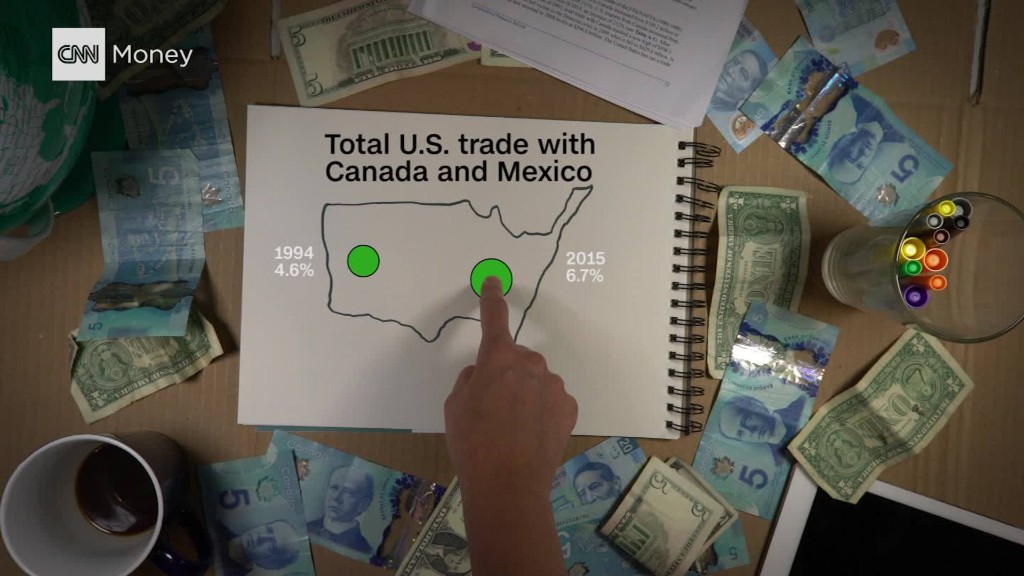
President-elect Donald Trump plans to get tough on Mexico and China starting Day 1 of his administration.
Top of Trump's wish list is to renegotiate or "terminate" NAFTA -- the North American Free Trade Agreement. He also wants to slap a 35% tax on goods, such as Ford (F) cars, that are made in Mexico and sold in the U.S.
Trump has called NAFTA the "worst trade deal in history," and blames it for the loss of manufacturing jobs in America's Rust Belt -- states that helped catapult him to victory last week.
Here's what you need to know about NAFTA.
What is NAFTA?
It is a trade agreement between Canada, Mexico and the United States that went into effect in 1994 under President Bill Clinton. The framework of the deal was first drafted under President Ronald Reagan in 1987.
NAFTA essentially eliminated almost all tariffs among the three nations, allowing for the seamless flow of goods and supplies across borders. Today, approximately $1.4 billion in goods cross the U.S.-Mexico border every day.
NAFTA also makes it easy for companies to move operations from the U.S. to Mexico.
Related: Trump's transition team: trade reform starts Day 1
Can Trump tear up NAFTA without Congress?
Yes. The President has the authority to withdraw from NAFTA under the rules of the agreement. He just has to give Canada and Mexico six months notice.
Has America lost jobs to Mexico because of NAFTA?
Yes, jobs have been lost. But it's not that simple, because there are also millions of U.S.-based jobs that depend on NAFTA.
The Economic Policy Institute estimates that about 800,000 jobs were lost to Mexico between 1997 and 2013. However, a nonpartisan report by Congress published in 2015 found "NAFTA did not cause the huge job losses feared by the critics." And there's analysis that shows America has lost more jobs to machines and automation than to Mexico.
No matter, there have been many anecdotes of companies moving jobs south of the border over the years. Air conditioner company Carrier announced just earlier this year that it is moving about 1,400 jobs from Indiana to Mexico.
However, the U.S. Chamber of Commerce says that about 6 million U.S. jobs depend on trade with Mexico.
Related: 3 ways Trump can use tariffs without Congress
Who wins from NAFTA?
U.S. companies, especially automakers, are clear winners because they get the benefit of cheap labor in Mexico.
Ford and GM (GM) have major operations in Mexico, but both employ far more people in the United States. Trump has heavily lambasted Ford for announcing that it will move some of its production from Michigan to Mexico. Ford has emphasized that the move won't lead to any lost jobs at its Michigan plant because it's going to produce different car models there.
Because it's cheaper to produce in Mexico, Americans benefit by paying lower prices for food, clothes, cars and electronics that come from Mexico.
Trade between all three nations has increased significantly, and particularly between America and Mexico. U.S. exports to Mexico last year were up nearly 470% compared to 1993, the year before NAFTA became law.
Related: 'Without NAFTA, we would be out of business'
Would tearing up NAFTA bring jobs back?
It's unlikely. When costs in one country rise -- as would happen with Mexico if NAFTA is killed -- companies just move operations to the next cheapest country. It could be another country in Latin America or an Asian nation.
Killing NAFTA would more likely cost U.S. jobs, millions of which depend on free trade with Mexico.
For example, denim manufacturers in America depend on NAFTA, even though their industry has lost lots of jobs due to free trade. They ship almost all of their denim to Mexico where it's cut into jeans and then sold back here in the U.S. All of that travel happens tax free because of NAFTA.
Denim manufacturers say tearing up NAFTA would make the cost of jeans from Mexico expensive. So even though they despise it, the manufacturers say ending NAFTA would hurt their businesses and jobs.
Canada is a bigger thorn when it comes to NAFTA
There are more NAFTA dispute cases between Canada and the U.S. than between Mexico and the U.S. In recent years, there have had more trade tensions with the country north of the border than south.


